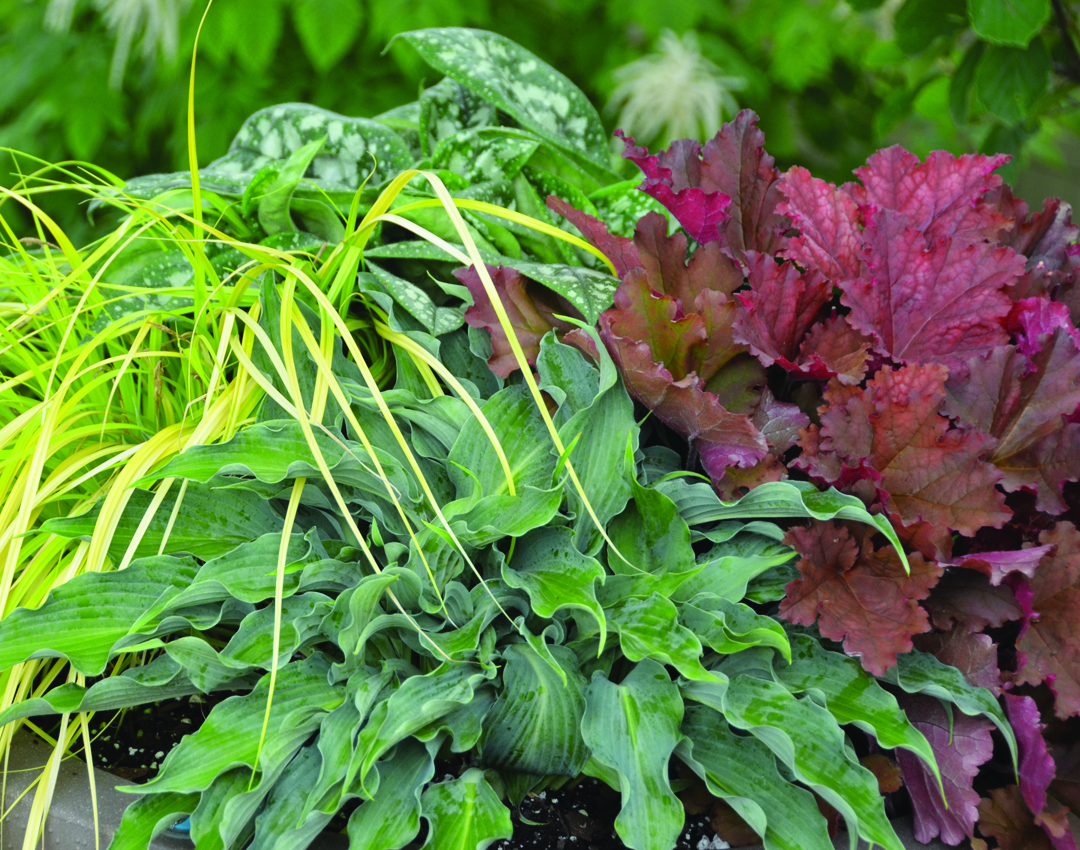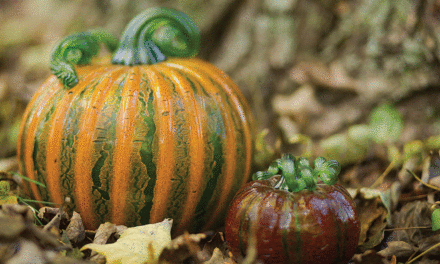
These plants make a good combination planting, even in the shade. Clockwise from left are: Carex Everillo, Hosta Waterslide, Heuchera Peachberry Ice and ‘Spot On’ Lungwort (Pulmonaria). (Photo courtesy Proven Winners)
As a former editor of The Mid-Atlantic Grower newspaper for horticulture and a garden club member, I get lots of e-mails about gardening.
Recently an e-mail from Proven Winners announced the launch of a new, free “Perfect Plant Pairings” tool which was developed to help answer the No. 1 question Proven Winners gets from gardeners — “Which plants go well together?”
The website, homeoutside.provenwinners.com, connects you with beautifully designed combinations of shrubs and perennials to fit your conditions, interests and style preferences.
You specify the amount of sun your planting area gets; your plant hardiness zone, and which traits are most important, such as seasonal interest, deer resistance, drought tolerance or easy care.
Finally, you select two colors, or choose “surprise me.”
The tool does the rest.
With my parameters of shade, zone 7a, request for ease of care, deer resistant and summer interest, I chose yellow and violet and got 15 pairings.
The site said there were no perfect matches, but the combinations suggested would work well in my garden.
I changed choices to spring, deer resistant and easy care in yellow and violet and got seven perfect matches plus 15 “similar” pairings.
One grouping included rhododendron and hellebore, which I already have, paired with a new lungwort — Pumonaria hybrid ‘Spot On.’
One thing I like is that you get a photo, not just the name of a plant. Also, characteristics such as mature height, deer or rabbit resistance and season of interest are listed.
The plants are limited to those available from Proven Winners and, of course, they would like you to order from them, so there’s an SKU number, container size and price.
You can place items in a shopping cart and complete the order as with any other online ordering website.
Or, you can download your pairings as a PDF to print out so you can make your purchases later at your local garden center.
I was impressed, and wondered if other companies had a similar tool. Searching for “companion planting” led to many suggestions for vegetable gardens, but I don’t have enough sun for vegetables.
A search for “plant combinations” took me to a Better Homes and Gardens site, www.bhg.com/gardening/flowers/perennials/perennial-plant-combinations/. Among the pairings were Double Pink Knock Out rose with perennials such as Salvia Sage. The next web page had easy-care natives, coneflower and black-eyed Susan.
On the fourth webpage, I found a “garden plan finder” which you can access directly at www.bhg.com/quizzes/garden-plan-finder/?psrc=BX_R812BR41234GF.
It said you could answer questions about light, moisture and other conditions and get an illustration of the garden at maturity, an easy-to-follow planting plan and a detailed plant list.
All I got was an error message. Perhaps too many people were trying to avail themselves of the site.
At www.gardenia.net/plant-combinations, you can refine your selection by season of interest, exposure, hardiness, zone, tolerance, maintenance, water needs, color… but only one of those factors at a time.
You can designate parameters at www.gardenia.net/garden-finder, but when I put mine in, there was “no data found.”
Without an annual membership, your experience will be limited, but there are a lot of enticing photos with information about the plants shown.
I went through all the filters at www.egardengo.com/explore-plant combinations, but by the time I entered zone 7, part shade, average water, native and habitat and then chose deer resistant, all the combo options disappeared.
Am I asking too much? Do deer eat all the natives that grow in the shade?
They do in my neighborhood!
Substituting “color theme” for the native requirement, I found 42 results including a chartreuse and magenta combination with Carex (sedge), heuchera, hosta and Weigela — all of which I do have, although not necessarily those particular varieties, growing happily along with pink, purple and yellow-flowering bulbs and shrubs in my garden.
If you merely want information about creating your own plant combinations, visit such sites as www.finegardening.com/article/plant-combinations-that-work or www.fromhousetohome.com/garden/plant-combinations.




